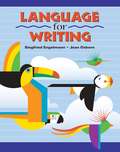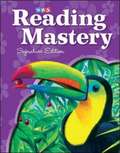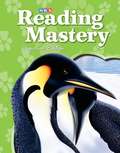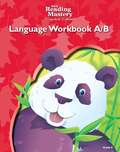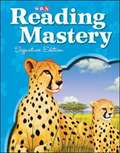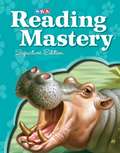- Table View
- List View
SRA: Imagine It!, Language Arts Handbook, Level 2 [Grade 2]
by Sra Mcgraw-HillNIMAC-sourced textbook
SRA: Imagine It!, Language Arts Handbook, Level 4 [Grade 4]
by Sra Mcgraw-HillNIMAC-sourced textbook
SRA: Imagine It!, Themes, I Think I Can Away We Grow!, Level 1, Book 1 [Grade 1]
by Carl Bereiter Andy Biemiller Joe CampioneNIMAC-sourced textbook
SRA: Imagine It!, Themes, Taking a Stand, Ancient Civilizations Ecology, Great Expectations, Earth in Action, Art and Impact, Level 6 [Grade 6]
by Carl Bereiter Andy Biemiller Joe CampioneNIMAC-sourced textbook
SRA: Language for Writing
by Jean Osborn Siefried EngelmannLanguage for Writing is a comprehensive writing program for students who need a highly structured approach to learn to write well. The program teaches the conventions students require to write clearly - the vocabulary needed to describe actions, events and objects, and the sentence structures necessary to put ideas into writing.
SRA: Reading Mastery, Signature Edition, Curriculum-Based Assessment and Fluency Student Handbook [Grade 4]
by Siegfried Engelmann Jean Osborn Steve OsbornNIMAC-sourced textbook
SRA: Reading Mastery, Signature Edition, Curriculum-Based Assessment and Fluency Student Handbook [Kindergarten]
by Siegfried Engelmann Elaine C. BrunerNIMAC-sourced textbook
SRA: Reading Mastery, Signature Edition, Language Arts Workbook [Grade 2]
by Jerry Silbert Siegfried Engelmann Karen Lou Seitz DavisWorkbooks provide skill and comprehension activities andshape students' ability to work independently.
SRA: Reading Mastery, Signature Edition, Language Presentation Book A, Grade K
by Siegfried Engelmann Jean OsbornNIMAC-sourced textbook
SRA: Reading Mastery, Signature Edition, Language Presentation Book B, Grade K
by Siegfried Engelmann Jean OsbornNIMAC-sourced textbook
SRA: Reading Mastery, Signature Edition, Language Presentation Book C, Grade K
by Siegfried Engelmann Jean OsbornNIMAC-sourced textbook
SRA: Reading Mastery, Signature Edition, Language Presentation Book D, Grade K
by Siegfried Engelmann Jean OsbornNIMAC-sourced textbook
SRA: Reading Mastery, Signature Edition, Language Workbook A & B [Kindergarten]
by Siegfried Engelmann Jean OsbornNIMAC-sourced textbook
SRA: Reading Mastery, Signature Edition, Language Workbook C & D [Kindergarten]
by Siegfried Engelmann Jean OsbornNIMAC-sourced textbook
SRA: Reading Mastery, Signature Edition, Literature Anthology [Grade 3]
by Siegfried Engelmann Susan HannerLiterature Collection and Guide (Grades K and 1) expand on skills students are learning in Reading Mastery Signature Edition.
SRA: Reading Mastery, Signature Edition, Picture Book for the Placement Test and the 15 Program Assessments [Kindergarten]
by Siegfried Engelmann Jean OsbornNIMAC-sourced textbook
SRA: Reading Mastery, Signature Edition, Presentation Book A, Grade K
by Siegfried Engelmann Elaine C. BrunerNIMAC-sourced textbook
SRA: Reading Mastery, Signature Edition, Presentation Book B, Grade K
by Siegfried Engelmann Elaine C. BrunerNIMAC-sourced textbook
SRA: Reading Mastery, Signature Edition, Presentation Book C, Grade K
by Siegfried Engelmann Elaine C. BrunerNIMAC-sourced textbook
SRA: Reading Mastery, Signature Edition, Storybook [Kindergarten]
by Siegfried Engelmann Elaine C. Bruner<i>Advisory: Bookshare has learned that this book offers only partial accessibility. We have kept it in the collection because it is useful for some of our members. To explore further access options with us, please contact us through the Book Quality link on the right sidebar. Benetech is actively working on projects to improve accessibility issues such as these. </i>
SRA: Reading Mastery, Signature Edition, Textbook B [Grade 5]
by Siegfried Engelmann Jean Osborn Steve OsbornReading Mastery textbooks are included in student materials focusing on helping students become fluent, accurate readers.
SRA: Reading Mastery, Signature Edition, WorkBook A [Kindergarten]
by Siegfried Engelmann Elaine C. BrunerNIMAC-sourced textbook
SRA: Reading Mastery, Signature Edition, WorkBook B [Kindergarten]
by Siegfried Engelmann Elaine C. BrunerNIMAC-sourced textbook
SRA: Reading Mastery, Signature Edition, WorkBook C [Kindergarten]
by Siegfried Engelmann Elaine C. BrunerNIMAC-sourced textbook


